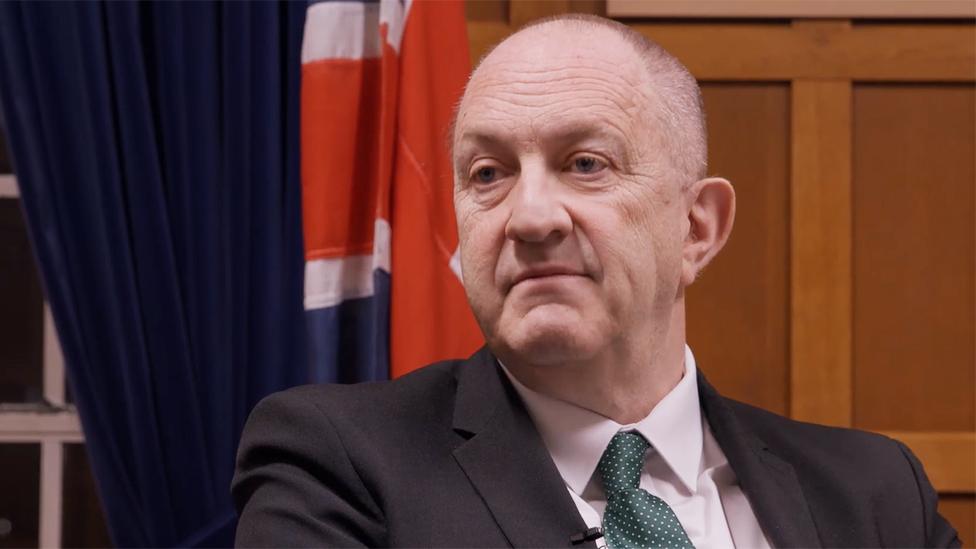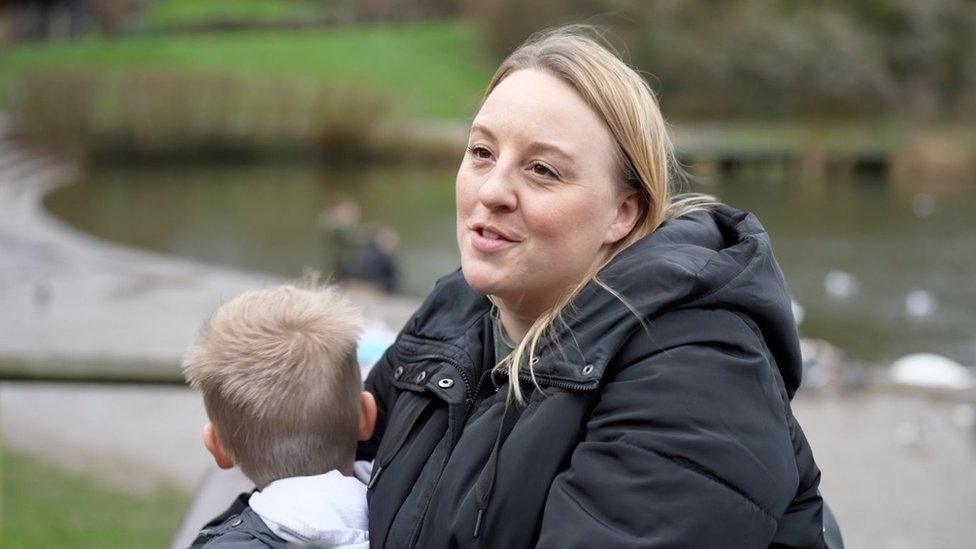Vital services or financial ruin? England's town hall dilemma
- Published

Saturday night in Romford, in the London Borough of Havering
From bin collections and street lighting to child protection and elderly care, councils provide services we all use, but in England more and more are in danger of going bust. BBC Panorama has followed the struggles of one such authority and the people who rely on it.
On a damp Saturday night at the dogs in Romford, people are out to enjoy themselves.
As greyhounds tear round this 100-year-old track, cash is changing hands rapidly with punters eager to place their bets.
This is the London Borough of Havering, where the eastern edges of the capital make way for the county of Essex.
People move here for the green spaces and transport links, but scratch the surface and many are angry.
Their local council is in a fight to stop itself going bust.
"We're paying for services, they're not delivering," says one man as he waits for the next race to start.
"It's dire because if you've paid your council tax, then your bins should be taken out," says another.
Over the past five months, BBC Panorama has followed Havering Council as it has struggled to balance its books and wrestled with decisions over which services to cut and which to protect.
This is a quiet crisis, but one that is being played out in town halls up and down England - shaping the quality of our daily lives.

The financial squeeze on town halls
Funding for councils across England is calculated on census information from 13 years ago - Havering has 10% more people living in the borough than in 2011
Havering says 70% of council spending goes on social care for adults and children - along with help for people who are homeless
Since legal changes in 2015, the number of young people in England eligible for Education, Health and Care Plans (EHCPs) - part-funded by councils - has doubled to more than half a million
In 10 years, the amount spent per person on children's services by town halls in England has risen from £120 to £212 (77%) - the equivalent adult social care spend is up from £252 to £372 (48%)
Sources: London Borough of Havering; DfE; County Councils Network/Pixel

Facing difficult facts
It's November 2023 and Havering's chief finance officer, Kathy Freeman, is meeting with councillors in one of the town hall's wooden-panelled rooms.
They are discussing a budget deficit which Kathy says they are "nowhere close to being able to address in the immediate term".
The council expects to have a £21m overspend on a budget of £630m this year. In the next financial year, it's predicted there will be a £32.5m gap.
If Havering cannot plug that hole of more than £50m in its finances over the next 12 months, Kathy is the person who will have to issue what is known as a section 114 notice - council-speak for effectively declaring the council bankrupt.

Havering's chief finance officer Kathy Freeman has lived in the area most of her life
Eight English councils have declared themselves effectively bankrupt since 2018 - among the most recent has been the country's largest authority, Birmingham.
Experts say that those authorities were not well managed, but they think it's a different situation for the councils now struggling to balance the books.
In fact, one in five English councils now says that it is danger of going bankrupt, external.
It's a crisis that cuts across political party lines. In Havering, councillors from the Havering Residents Association (HRA) form the majority.
As one of the borough's most senior officials, Kathy is all too aware that cuts will have to be made. But she is also a local resident.
"I've lived here since I was seven years old, so I really do care about the impact it has," she says.
Reducing the number of bin collections, dimming streetlights in the early hours, and increasing parking charges, are among the money saving plans being considered, along with a 4.99% rise in council tax - the maximum a council is normally allowed to impose.
At the meeting, with the numbers set out in front of him, council leader Ray Morgon, describes it as "the most challenging budget I've seen in the history of Havering Council".
"The problem is many people think council tax is primarily spent on cleaning their streets, repairing their roads, providing libraries," he says. "But it's not."
Harley's bus
In Havering, 70% of the council's spending goes on adults and children's social care, along with help for people who are homeless.
One of the areas where demand has increased has been in services for children with special educational needs.
Havering has a legal duty to provide help for people like 17-year-old Harley. He had a brain tumour removed as a child, and he also has autism.

"I just like being on the bus with my mates," says Harley
The council has helped adapt the family home to make life easier and funds some of the expensive equipment he needs, such as hoists and his wheelchair.
It also supports Harley getting to and from college. Each morning a bus picks him up from home and takes him and other students to their school.
"The transport is huge because he wants to be as independent as he can, he's going to college," says his mother, Ila. "He needs to feel included and to be able to experience as much as he can, the same as everyone else can."
Havering provides school transport for more than 420 children with special needs at a cost of £6.5m a year.
In its search for cuts, the council is considering reducing the number of buses. For some pupils they could be replaced by car-sharing, but decisions will be made on a case-by-case basis.
Harley is very clear about its importance. "I just like being on the bus with my mates. That's my life now," he says.
Under pressure
There is an Education, Health and Care Plan (EHCP) in place for Harley. This is his key to getting support.
Since legal changes in 2015, the number of young people eligible for these plans in England has doubled to more than half a million, according to official data, external.
The growing demand for a wide range of children's services is one of the reasons councils such as Havering are under such severe financial pressure.
The County Councils Network, external and Pixel Financial Management have shared new analysis of per-person spending on children's services over the past decade with Panorama.

Paying More for Less: Councils in Crisis
Filmed over five months inside a council on the verge of bankruptcy, Panorama explores why many town halls across the UK are in financial crisis.
As the clock ticks down to decision day, Alison Holt discovers how spiralling care costs for children, the elderly and homeless people are threatening to push the council - and others across the UK - into the red.
Watch now on BBC iPlayer (UK Only) or on BBC One at 20:00 on Monday 18 March (20:30 in Wales)

They say in 2013/14 councils in England were spending an average of £120 per person, by 2023/24 that had risen to £212 - a 77% increase.
Spending on adult social care has risen from £252 to £372 per person in the same period - a 48% rise.
And families are under pressure. Calls to Havering's child protection helpline have increased by 60% in the past four years.
There has also been an increase in the number of children taken into residential care by the council, and the costs have risen steeply.
"These are children with some complex behavioural issues or concerns around exploitation and their need for safety," says Tara Geere, Havering's newly appointed director of children's services.
"In the last 12 months, the highest place that I've had to pay for was £28,000 per week. That's in excess of £1m a year if that child was to stay there."
Children's services in the borough are overspent by £9m. In its ongoing search for savings, the council expects to close three of its five children's centres, even though their focus on early help for families can prevent later problems.
Havering says that while demand for services has increased significantly, the money it gets from central government has reduced in real terms in the last decade.
As with all councils in England, the funds Havering receives are calculated on the number of people living in the area in 2011.
However, its population has now grown by 25,000 people - 10% - since then. It includes a big rise in the number of children - up 15%. That's the equivalent of 216 extra school classes of 30.
Housing is another pressure point. More families are facing homelessness and turning to the council for help.
Jonelle's story
Jonelle has spent seven months living in one hotel room with her three small children. They were evicted from their flat after their private landlord decided to sell the property.
She has lived in Havering all her life, but there are few places she says she can afford. She has viewed numerous houses, without any success.
"There would be queues of up to 20 people," she says, "and they'd all say that people were offering six months' worth of rent. It was so competitive."
In the past year, Havering has housed more than 500 families in hotels. Five years ago, there were none.

Jonelle was housed in a hotel with her children for several months
Putting a family in a hotel costs the council about £24,000 a year more than housing them in a rented property. It is a situation that is not working for anyone.
Jonelle feels it has really affected her children.
"Every day is just a set of different challenges," says Jonelle. "When I do buy food, I can't buy a lot because there's no fridge. I do feel very powerless. But I'm trying to keep strong, because it's either this or being on the street."
Last week the family was moved to a hostel, where they have a small kitchen. Jonelle says she has been told they could be there for 18 months.
In England, the number of requests for council help from people who are homeless has jumped by 12% in a year to 87,000., external
New year, same problems
In January, the government announces some additional money for English councils, external, including £500m for adult and children's services. In Havering, council officials expect that will mean they get £2m of this money - welcome news, but not enough to solve their financial problems.
They have asked the government for a loan of up to £54m.
In total, 19 councils in England have borrowed £2.5bn from central government this year.
The government says that local councils are "responsible for their own finances and setting council tax levels", and points to the extra money it has given.
It also says it has told councils they should be "mindful of cost-of-living pressures while controlling any unnecessary or wasteful expenditures".
Labour says it views local authority funding as a priority. It says it would change the current one-year financial settlements for councils to two years to increase their stability. It would also consult on a longer-term financial settlement.
The Liberal Democrats say they want to give councils more powers and increase their funding.
There is a blow for Havering's children's services in February. The regulator Ofsted, rates them as inadequate.
It says families needing help face too many delays, social workers have caseloads which are too high, management oversight is poor and there are staff shortages. Unusually, it also says more money needs to be put into delivering these important services.
The council apologises to the people of Havering saying children and families are waiting too long for help.
'Kicking the can down the road'
In early March, hours before councillors are due to agree the budget for the year ahead, Havering is told it will get the government loan it needs.
Councillor Ray Morgon has to sign a letter before the close of business that day, agreeing to the terms.

Council leader Ray Morgon: "Local government finance needs a complete reset"
It means not all the cuts will go ahead and it staves off effective bankruptcy, but it also saddles Havering with high debt repayments for the next 20 years.
"It's relief on one hand," he says, "but of course, it is only kicking the can down the road. And we'll probably be in the same position next year.
"The whole system of local government finance needs a complete reset. It's broken."

What is your opinion? Please share your experiences by emailing haveyoursay@bbc.co.uk, external.
Please include a contact number if you are willing to speak to a BBC journalist. You can also get in touch in the following ways:
WhatsApp: +44 7756 165803
Tweet: @BBC_HaveYourSay, external
Please read our terms & conditions and privacy policy
If you are reading this page and can't see the form you will need to visit the mobile version of the BBC website to submit your question or comment or you can email us at HaveYourSay@bbc.co.uk, external. Please include your name, age and location with any submission.
- Published28 February 2024
